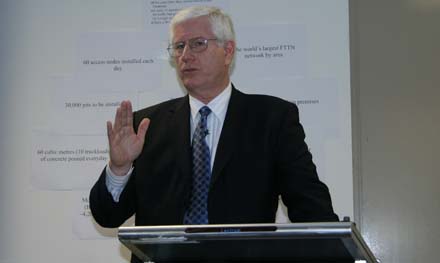Winn's time had come

analysis There weren't any deep, dark reasons behind Greg Winn's departure from Telstra, analysts said yesterday, with the executive just wanting to head home to the US.

Greg Winn
(Credit: Suzanne Tindal/ZDNet.com.au)
"It doesn't mean a great deal," Ovum research director David Kennedy told ZDNet.com.au. "Winn's always made it clear that he wasn't in Australia indefinitely."
IBRS advisor Guy Cranswick agreed. "After 3.5 years it's quite typical for a senior executive to do something else, especially when they have steered such strategic work," he said.
David Cannon, senior telecommunications analyst at IDC, speculated that Winn had spent Christmas in the US, had become homesick and decided this was the time, since much of transformation work had been done. "All the macro stuff has been done. It's sort of the last bit to finish up," he said.
The analysts didn't believe his departure would adversely affect Telstra's transformation project. "There are some smart cookies within Telstra," Cannon said.
The National Broadband Network had likely not been the catalyst, the analysts believed, as Winn had expressed scepticism at Telstra events that building the network had a business case at all, even before the company was kicked out of the bid process.
One question was if Winn would have stayed if Telstra had been chosen for the National Broadband Network. No one could know, Cannon said. "I would guess that the answer to that would be yes, because it's such an engineering feat," he ventured.
He pointed out, however, that Telstra's omission also represented a massive task, since Telstra's response to the National Broadband Network needed to be coordinated.
As for the lack of a replacement appointment, Telstra said that the executives under Winn, such as senior VP transformation and technology Tim Lamming, and group managing director Networks and Services Michael Rocca would take up the slack, having been trained up for his departure.
IBRS's Cranswick believed it indicated that Telstra was, or would be, in a holding pattern, possibly indicating the depth of business contraction expected over this year.
IDC's Cannon wondered if CEO Sol Trujillo's own time was near and noted the company could wait to appoint a new COO until a new CEO could appoint his own.
Yet Ovum's Kennedy didn't believe that Trujillo would leave until he had seen through the 2010 financial targets to which he was personally committed. A Telstra spokesperson said that Trujillo still had lots to do in Australia.